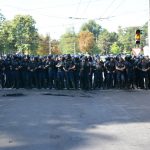NZ Man Dies Inside Australian Immigration Detention Centre

The recent death of a New Zealand man inside Villawood Detention Centre has raised further concerns about Australia’s treatment of those held inside the privately run facility.
Rob Peihopa, 42, was found unconscious by staff at Villawood Detention Centre in Sydney just before 10pm last Monday.
Mr Peihopa was facing deportation to New Zealand, and had been stuck inside the centre for nearly 10 months after serving prison time for dangerous driving charges. His Australian partner, Tracy McPherson, said he should have been allowed to return home sooner.
“Why are these people being put into these detention centres and left there to rot?
“You know, it’s just not fair, they’ve done their time in jail. It’s time to go home to your family, to your children.”
Mr Peihopa was one of hundreds of New Zealanders trapped inside the Australia’s immigration detention system. In December 2014, the Government changed section 501 of the Migration Act allowing visas to be revoked if non-citizens hold a “substantial criminal record.”
The changes altered the definition of “substantial” to include multiple past offences that add up to 12 months, and broadened it to include suspended sentences or time spent in a “facility or institution”, such as a rehabilitation centre.
Since September last year, 406 New Zealanders have had their visas cancelled, 95 of them have been deported and 184 are in detention centres – including Christmas Island. It is estimated that half the New Zealanders affected have lived in Australia for more than a decade.
Australia’s detention of New Zealanders has become a flash-point between the two neighbours, with an average of one New Zealander being stripped of their visa each day.
“It is a human rights issue,” New Zealand Labour MP Kelvin Davis said to the Saturday Paper.
“Some people … have come across as babies: they’ve been educated in Australia, they’ve found work in Australia, they’ve married and had children and grandchildren in Australia. They consider themselves Australian; they just happen to be officially New Zealand citizens.”
Foul Play Suspected
Mr Davis believes the conditions of Australian immigration detention centres, run by private security company Serco, are inadequate and dangerous. The centres have previously come under scrutiny for lax safety standards – leading some to suspect foul play in Mr Peihopa’s death.
Two fellow detainees have reported that Mr Peihopa was viciously attacked before his death, and that the official story, that he suffered a heart-attack, is a cover-up by Serco.
Rawio Fowell, one of the detainees, told New Zealand Radio that Serco staff and several detainees told him Mr Peihopa was involved in a fight, and showed signs of being badly beaten up.
“If it was a heart attack, why did he have a gash on his face and two black eyes?
“Serco’s only saying that it was a heart attack so they don’t look bad.”
Mr Davis also told NZR that he had also heard reports about the altercation, but did not want to reach a premature conclusion about the cause of death. Instead, he said it was a reminder that New Zealanders are unsafe in Australia’s detention network, and should be allowed to travel home.
“It’s the whole issue about why these guys are in the detention centre when they’ve already served their time in prison… They should be allowed to go home to their families, and then if their visas are revoked, they can be sent home.”
Despite the criticism, Australian Immigration Minister Peter Dutton has stood by his Government’s decision to lock New Zealanders in detention, telling the ABC:
“If somebody is here on a visa, whether they’re from New Zealand or elsewhere, if they’ve committed a crime they have their visa cancelled. And they face the criminal penalty and administratively their visa is cancelled.”
Private Contractors on Nauru Criticised for Abuse
Meanwhile on Nauru, another privately-run Australian detention centre, several guards have been accused of assaulting a group of teenagers this week.
The complaint, signed by at least 75 asylum seekers within the facility, has been handed to authorities on Nauru and within the camp. The group allege that seven teenagers were assaulted by Wilson Security Guards during a protest on 6 April.
“We are witness that Wilson Securities… hit everyone including children. We are not feeling safe now. We are making a request to Wilson’s boss to investigate this matter,” the complaint says.
“We are asking that those that made threats to us and hit us must not be around us.”
The group provided photographs of bruising they claim occurred as a result of the guard’s force.
This is not the first time security practices within the camp, run by the private company Transfield, with security subcontracted to Wilson Security, have come under fire. In 2015, the Moss Review revealed instances of rape, child abuse and self-harm.
This is cause for concern locally, as Transfield and Serco could end up running prisons in New South Wales after the State Government announced its intention to trial private prisons.
Earlier this week, Elaine Pearson, director of Human Rights Watch Australia, told Sydney Criminal Lawyers® that the country’s immigration detention networks were undermining Australia’s credibility on human rights:
“[The detention facilities are] a severe violation of human rights. Those people have been treated in inhumane ways, locked up for years on end in detention, and left to languish in an indefinite limbo.”
If Nauru and Villawood are anything to go by, she may be right.






